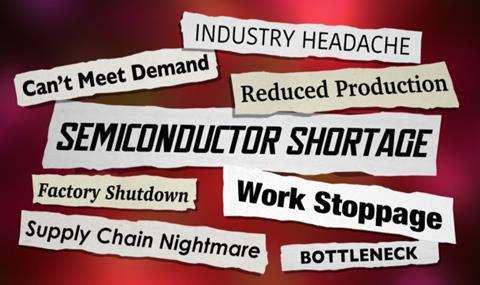
As Scania Trucks announced a week-long shut down at its European plants today (31 August), due to the global shortage of semi-conductors, other truck manufacturers told MT they are also struggling with the shortage and warned of extended lead times on truck orders next year.
The problem has been exacerbated by the Covid-19 pandemic lockdowns which saw workforces grounded and the resulting soaring consumer demand for laptops and gaming devices as people were confined to their homes.
For truck manufacturers the shortage has been heightened by strong demand for new trucks as the economy recovers and the boom in e-commerce continues.
Martin Tomlinson, head of media at Volvo Trucks said: “The shortage has been a challenge. We are still building and supplying trucks but that lead time of 24 weeks has almost doubled for some models.
“In the short term we have the products and they are being delivered so there is no supply issue there but in the longer term going into next year, we cannot be sure of the lead time.”
Tomlinson said anyone ordering an HF or HM now could see delivery in May next year, depending on how complex the specification. He added: “It is not all models. If you want an electric truck we can get you one in 14 weeks because it is a different product on a different line, with different infrastructure and logistics. The worst hit are the heavy duty HF and HM range of vehicles.
“It is strange considering we are in a very buoyant market, and seeing unprecedented demand which is pent up from the pandemic and the uncertainty at the start of it. As it turned out, the industry has not been that badly affected and we are seeing strong demand. However I would say for certain specs you be looking at delivery in May next year if you ordered now.”
Daimler, which owns Mercedes Benz Trucks, said it has also felt the effects of the chip shortage. A spokesman said: “We are aware of the current critical supply situation on the semiconductor market which also has an impact on the Daimler Truck supply chain.
Read more
- Scania halts truck production as global chip shortage crisis continues
- Semiconductor shortage slows upturn in commercial vehicle production
- Act now to support engine production, SMMT urges government
“We are monitoring the situation closely and are in constant contact with our suppliers. We are running on sight. Due to the high level of flexibility in our plants, we can react to such fluctuations at short notice and we adapt our production program accordingly.”
Iveco said it was working with customers to manage the delays caused by the shortage. Gareth Lumsdaine, director truck business line told MT: “Like all manufacturers, Iveco has been facing shortages in raw materials, and semiconductors in particular.
“This is one of several factors that have created supply chain issues. The capacity constraints, logistics congestion and surge in demand we have seen in 2021, have made it difficult to limit the impact on our manufacturing plants.
“We have worked with affected customers and where possible have extended their trucks to help manage and mitigate the situation. Despite the aforementioned we are seeing a very positive order intake development and we have positive market expectations – Europe wide IVECO is performing at a record level.”
Meanwhile DAF said it is making changes to its production processes to cope with the situation. Laurence Drake, MD, DAF Trucks UK, said: “Naturally, DAF Trucks, like the entire automotive sector, has felt the impact of the global shortage of semiconductor chips. However our teams are working closely with our suppliers and, where necessary, adapting processes to minimise the issue for our customers.”
The Society of Motor Manufacturers (SMMT) told MT the chip shortage threatens to slow down the recovery from the pandemic. Chief executive, said: “After a tough start to the year, commercial vehicle production is steadily recovering against a backdrop of increased demand as global economies unlock after the pandemic.
“However, the global semiconductor shortage continues to disrupt this progress, affecting both production and supply chains for trucks and the worldwide global automotive industry.
“Despite the best efforts of manufacturers to lessen the impact and avoid any inconvenience, there may be delays in new vehicle supply, reflected in the latest truck registration figures, which are down by a fifth compared to the pre-pandemic average.
“With the semiconductor shortage likely to last for at least the rest of the year, the automotive sector continues to engage with government to identify and implement additional support measures so the UK’s economic recovery remains on track.”










